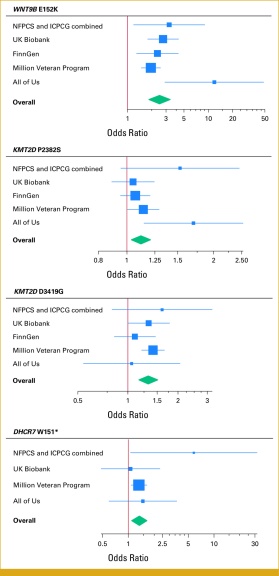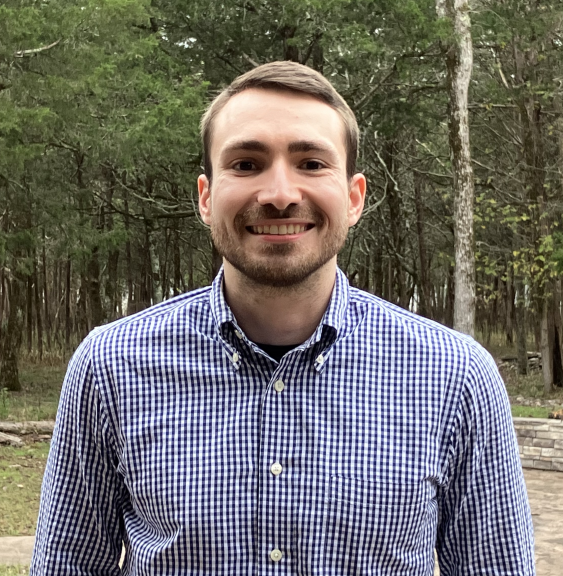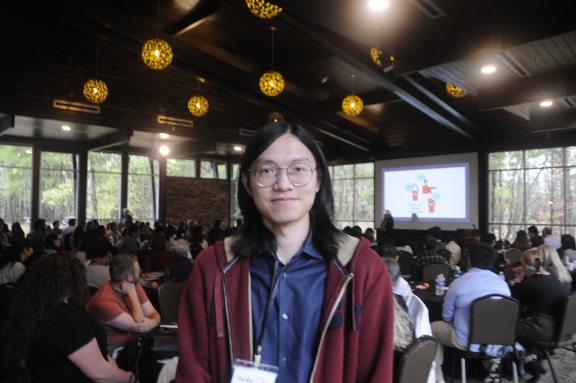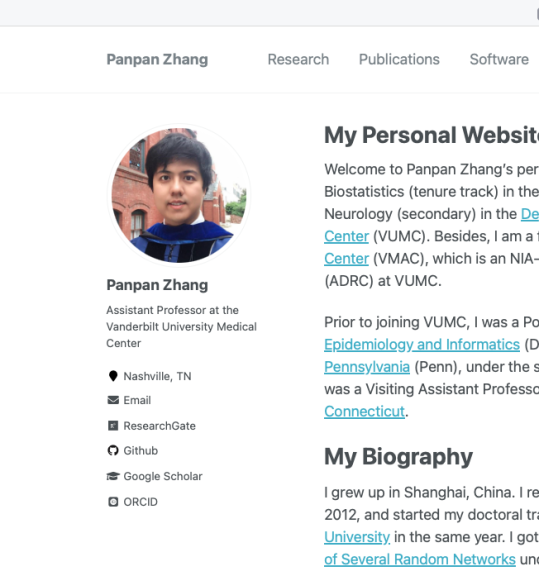Bill Dupont is first author of JCO Precision Oncology paper
Congratulations to professor of biostatistics and health policy William D. Dupont, PhD, FASA, on the publication of Coding Variants of the Genitourinary Development Gene WNT9B Carry High Risk for Prostate Cancer, published January 28 in JCO Precision Oncology in collaboration with Angela Jones (VANTAGE), Jeffrey R. Smith (Department of Medicine), and the VA Million Veteran Program. Dr. Dupont and Dr. Smith are also affiliated with the Medical Research Service of the Tennessee Valley Healthcare System, and the study was supported by grants from the Veterans Health Administration, the V Foundation for Cancer Research, and the National Institutes of Health, with data drawn from the NIH's All of Us program, the Nashville Familial Prostate Cancer Study (NFPCS), the International Consortium for Prostate Cancer Genetics (ICPCG), UK Biobank, and FinnGen.
The goal of the study was to detect and confirm potential links between specific genes and hereditary prostate cancer. Dr. Dupont and his colleagues used genome-wide single-allele and identity-by-descent analytic approaches to identify pathogenic variants (i.e., mutations) that prostate cancer patients might have in common, and then attempted to replicate their observations with data from the biobanks listed above, confirming the association of two genes — HOXB13 and WNT9B — with high risk of prostate cancer. The paper is the first to discuss WNT9B as a factor in the transmission of prostate cancer. Both genes are vital to prostate development, which suggests that other genes with that characteristic may likewise elevate an individual's risk of developing genitourinary cancer. This new knowledge can help biomedical researchers develop ways to prevent and treat this type of cancer.

Bryan Blette honored with 2024 Art Wheeler Studio Award
Congratulations to assistant professor Bryan Blette, winner of the 2024 Art Wheeler Studio Award. Named after the late Arthur P. Wheeler, a renowned pulmonologist and leader in critical care medicine, the award recognizes an individual "who has demonstrated a passion for improving study quality through significant contributions to the VICTR [Vanderbilt Institute for Clinical and Translational Research] Studio Program."
The VICTR Studio Program supports Vanderbilt University Medical Center and Meharry Medical College researchers by hosting structured sessions where experts assist investigators with a specific stage or aspect of their studies. VICTR offers seven different types of studios (hypothesis generation, design, specific aims, grant review, manuscript, implementation, and community engagement), with hundreds of sessions conducted since 2007. A studio typically brings together an investigator, the investigator’s mentor/teacher (if applicable), an experienced moderator, up to six content and process experts, and a biostatistician.
The criteria for the Art Wheeler Studio Award includes quality of expertise shared and consistent involvement with the program, along with feedback from studio participants. Previous winners of the Wheeler Award include Dr. Cheryl Gatto, then research assistant professor of biostatistics and now operations director of VICTR's Center for Learning Healthcare.
Dr. Blette earned his PhD in biostatistics from the University of North Carolina, followed by postdoctoral work at the University of Pennsylvania before joining VUMC's Department of Biostatistics in 2023, where he is a mainstay of the Biostatistics Clinics program and the Vanderbilt Biostatistics Data Coordinating Center.

Huiding "Eric" Chen wins ASA Student Paper Award
Congratulations to PhD candidate Huiding “Eric” Chen on the selection of “Synthetic Sampling Weights for Volunteer-Based National Biobanks: A Case Study with the All of Us Research Program” as one of five winning papers in the 2025 Student Paper Competition sponsored by American Statistical Association’s Consortium of Sections. The consortium consists of the ASA’s Government Statistics Section, Survey Research Methods Section, and Social Statistics Section. Papers entered the competition had to involve either a new statistical methodology or creative application of statistical analyses to a problem, issue, or policy question pertinent to the consortium’s subject areas.
As the author of a top student paper, Chen will receive a $1,000 stipend and present his work this August at a topic-contributed session during the 2025 Joint Statistical Meetings. One of the largest statistical events in the world, JSM is expected to draw more than five thousand attendees from over fifty countries to Nashville. Alumna Christina Tripp Saunders (PhD 2018), now a statistical scientist at Berry Consultants, was a winner of the GSS/SRMS/SSS competition in 2018.
Chen earned his Bachelor of Natural Science degree in statistics at Zhejiang University (Hangzhou, China), a top Chinese educational institution, followed by his master’s degree in biostatistics at Georgetown University. His dissertation advisor is Qingxia “Cindy” Chen, professor of biostatistics, biomedical informatics, and ophthalmology & visual sciences, and contact PI for the NIH-funded DARSaW project (Developing, Assessing, and Refining Synthetic Sampling Weights to Improve Generalizability of the All of Us Research Program Data). Huiding Chen has served as a data and quantitative analyst for All of Us since 2022, developing novel statistical methods to improve the weighting methods for non-probability sampling cohorts and leveraging Big Microdata from national surveys (e.g., PUMS, NHIS, NHANES) for calibration. His publications include “Evaluation of inpatient medication guidance from an artificial intelligence chatbot” in American Journal of Health-System Pharmacy (2023).

Study in multiancestry populations uncovers new insights into breast cancer genetics
Associate professor Ran Tao co-authored this study.
Statistical Computing Series: Creating a Personal Website with GitHub
The Statistical Computing Series hosted by Vanderbilt University Medical Center's Department of Biostatistics features presentations on the implementation of statistical models and methods, statistical computation, and graphics. These informal meetings allow experienced statisticians and developers to share their expertise on computing topics with practitioners across Vanderbilt. On Thursday, January 30, 2025, at 1:30 pm Central Time on Teams, assistant professor Panpan Zhang will present "Creating a Personal Website with GitHub." Here is his description:
I will introduce some fundamental techniques for creating a GitHub website with JekyII. A few examples will be presented. A template, together with a detailed README demonstration, will be shared on github.com/vubiostat.
For access to this webinar, contact series organizer Ryan Moore.

AI tested for alerting clinicians of suicide risk at three VUMC clinics
Professor Qingxia "Cindy" Chen co-authored this study.
VUMC study shows identifying changes in vision may be sufficient to diagnose mild TBI
Co-authors of the featured paper include professor Qingxia "Cindy" Chen and senior biostatistician Xiangyu Ji.
Xiangyu Ji promoted to senior biostatistician
We are pleased to announce the promotion of Xiangyu Ji to senior biostatistician, effective January 3. Ji earned her Bachelor of Science degree in public health from California State University Los Angeles, with a data management internship at the University of Southern California Keck School of Medicine prior to graduation. As a student in our master's program, Ji wrote her thesis, "Evaluating uses of machine learning in propensity score estimation on time-to-event data: A simulation study," under the supervision of Amber Hackstadt. As a staff biostatistician, her primary collaboration is with the Vanderbilt Eye Institute / Department of Ophthalmology and Visual Sciences, where her activities have included planning and conducting process standardization for resident research projects, including drafting project roadmaps, creating administrative file templates, and developing data entry protocols. She has also provided biostatistical support to the Division of Gastroenterology, Hepatology, and Nutrition, in the Department of Medicine; the Department of Biomedical Informatics; and Vanderbilt Orthopaedics. She has co-authored peer-reviewed publications in BMC Ophthalmology, Journal of the Academy of Ophthalmology, Thyroid, Ophthalmology, OSLI (Ophthalmic Surgery, Lasers and Imaging) Retina, and JAMA Ophthalmology, with five additional manuscripts under revision or review, all in collaboration with professor Cindy Chen.
Lauren Samuels promoted to research associate professor
We are pleased to announce the promotion of Lauren "Laurie" Samuels to research associate professor, effective January 1. Dr. Samuels earned her bachelor's degree in religious studies at Yale University, enrolling at Vanderbilt after seven years in the workforce for an MEd in secondary education. After serving in Americorps, tutoring Bowie Reading and Learning Center students in math and science, and supporting Vanderbilt's Center for Evaluation and Program Improvement as a research assistant, data manager, and SAS programmer, Dr. Samuels joined our doctoral program and graduated with her PhD in 2017.
Since her initial appointment as a research instructor in 2017 and subsequent promotion to research assistant professor in 2018, Dr. Samuels has proven herself to be a valuable, versatile, and highly engaged collaborator on both research investigations and pedagogical initiatives. She is co-investigator on two R01-funded projects led by Dr. Bill Heerman, "COACH: Competency Based Approaches for Community Health" and "The ADAPT Trial: Adapting Evidence-Based Obesity Interventions in Community Settings"; first author of papers in Statistics in Medicine and Observational Studies; and a current participant in the Fleming Society Academy for Excellence in Education Mentorship Program.
Proteomic signature a key to early detection of fatty liver disease: study
This paper's co-authors include senior statistical genetic analyst Joey Stolze, assistant professor Shilin Zhao, and research assistant professor Shi Huang.